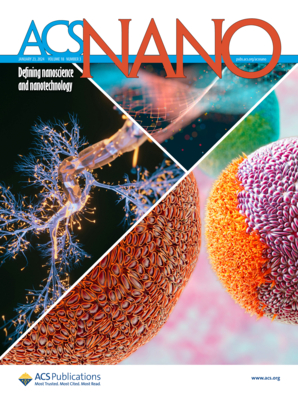Biosynthesis of Melanin with Engineered Probiotics for Oral Treatment of Ulcerative Colitis
IF 15.8
1区 材料科学
Q1 CHEMISTRY, MULTIDISCIPLINARY
引用次数: 0
Abstract
Ulcerative colitis (UC) is a chronic intestinal inflammation characterized by immune overactivity and gut microbiota imbalance, leading to oxidative stress and inflammation. New therapeutics are required because existing ones are frequently unsuccessful and have long-term adverse effects. The research aims to manage oxidative stress and restore gut microbiota balance. The benefits of probiotics for UC can be compromised by gastrointestinal conditions that interfere with their adhesion and activity. Coating methods enhance bacterial survival in the gastrointestinal environment but face challenges like instability at low pH, short-lived effects, complexity, layer interactions, and biosafety issues. Melanin-like nanozymes are stable in the gastrointestinal environment and effectively scavenge reactive oxygen species, specifically targeting colitis lesions. We developed biosynthetic melanin-producing engineered bacteria (EcN-Mel) derived from genetically modified Nissle 1917 Escherichia coli expressing tyrosinase genes. This study evaluated the feasibility and effectiveness of administering EcN-Mel orally in UC mouse models. Results showed that EcN-Mel produced and secreted melanin, exhibiting targeted intestinal adhesion, a free radical scavenging ability, and gastrointestinal stability. In vivo imaging revealed increased colonization efficiency and retention time of EcN-Mel in inflamed intestinal segments. EcN-Mel enhances beneficial bacteria of the Lactobacillus genus while decreasing harmful members of the Proteobacteria genus, promoting gut microbiota homeostasis, and alleviating colitis. EcN-Mel alleviated intestinal mucosal damage through combined actions, including gut microbiota modulation, oxidative stress reversal, cytokine regulation, and barrier restoration. Our findings confirm the safety, feasibility, and effectiveness of EcN-Mel for UC treatment.

用工程益生菌合成黑色素治疗溃疡性结肠炎
溃疡性结肠炎(UC)是一种以免疫过度活跃和肠道菌群失衡为特征的慢性肠道炎症,导致氧化应激和炎症。需要新的治疗方法,因为现有的治疗方法往往不成功,而且有长期的副作用。这项研究旨在控制氧化应激,恢复肠道菌群平衡。益生菌对UC的益处可能会受到胃肠道疾病的影响,这些疾病会干扰益生菌的粘附和活性。涂层方法可以提高细菌在胃肠道环境中的生存能力,但也面临着低pH下不稳定、效果短暂、复杂性、层间相互作用和生物安全性等问题。黑色素样纳米酶在胃肠道环境中是稳定的,并有效地清除活性氧,特别是针对结肠炎病变。我们从表达酪氨酸酶基因的转基因Nissle 1917大肠杆菌中获得了生物合成黑色素生成工程菌(EcN-Mel)。本研究评估了UC小鼠模型口服EcN-Mel的可行性和有效性。结果表明,EcN-Mel产生和分泌黑色素,具有靶向肠道粘连、自由基清除能力和胃肠道稳定性。体内成像显示EcN-Mel在炎症肠段的定植效率和滞留时间增加。EcN-Mel增强乳酸杆菌属有益菌群,减少变形杆菌属有害菌群,促进肠道菌群稳态,缓解结肠炎。EcN-Mel通过肠道菌群调节、氧化应激逆转、细胞因子调节和屏障修复等综合作用减轻肠黏膜损伤。我们的研究结果证实了EcN-Mel治疗UC的安全性、可行性和有效性。
本文章由计算机程序翻译,如有差异,请以英文原文为准。
求助全文
约1分钟内获得全文
求助全文
来源期刊

ACS Nano
工程技术-材料科学:综合
CiteScore
26.00
自引率
4.10%
发文量
1627
审稿时长
1.7 months
期刊介绍:
ACS Nano, published monthly, serves as an international forum for comprehensive articles on nanoscience and nanotechnology research at the intersections of chemistry, biology, materials science, physics, and engineering. The journal fosters communication among scientists in these communities, facilitating collaboration, new research opportunities, and advancements through discoveries. ACS Nano covers synthesis, assembly, characterization, theory, and simulation of nanostructures, nanobiotechnology, nanofabrication, methods and tools for nanoscience and nanotechnology, and self- and directed-assembly. Alongside original research articles, it offers thorough reviews, perspectives on cutting-edge research, and discussions envisioning the future of nanoscience and nanotechnology.
 求助内容:
求助内容: 应助结果提醒方式:
应助结果提醒方式:


